Philadelphia 11 ordinations marked with calls for continued justice work40th anniversary celebration includes memories, speeches, joyous Eucharist,Posted Jul 28, 2014 |
|
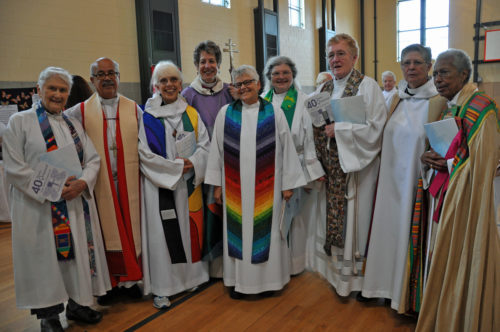
Among those who attended the July 26 celebration in Philadelphia were some history-makers. They included, left to right, the Rev. Alison Cheek (Philadelphia 11), retired Bishop of Costa Rica Antonio Ramos (who joined in the laying on of hands at the Philadelphia 11 ordinations), the Rev. Carter Heyward (Philadelphia 11), Presiding Bishop Katharine Jefferts Schori (whose election in 2006 made her the first women primate in the Anglican Communion), the Rev. Merrill Bittner (Philadelphia 11), the Rev. Betty Powell (one of the Washington Four who were ordained in September 1975), the Rev. Marie Moorefield Fleischer (Philadelphia 11), the Rev. Nancy Wittig (Philadelphia 11) and retired Massachusetts Bishop Suffragan Barbara Harris (who is this year celebrating the 25th anniversary of her consecration as the first woman bishop in the Anglican Communion). Photo: Mary Frances Schjonberg/Episcopal News Service
An interactive timeline of the history of women’s ordination in the Anglican Communion is here.
[Episcopal News Service – Philadelphia, Pennsylvania] A joyous celebration of the 40th anniversary of women’s priestly ordination on July 26 here included calls for people to realize that the dream of a more egalitarian and less patriarchal Episcopal Church – and society – that was embodied by the Philadelphia 11’s ordinations requires much more work.
“I wonder why we cannot speed up the work of gender justice and aligned oppressions in the days and years ahead,” Fredrica Thompsett Harris, Mary Wolfe Professor Emerita of Historical Theology at Episcopal Divinity School, asked during her keynote address to a symposium that kicked off a day meant to celebrate the July 29, 1974, ordinations of 11 women deacons at Church of the Advocate here. “This would be one way to honor our courageous sisters and those who stood with them.”
The Rev. Merrill Bittner, the Rev. Alison Cheek, the Rev. Alla Bozarth, the Rev. Emily C. Hewitt, the Rev. Carter Heyward, the Rev. Suzanne R. Hiatt, the Rev. Marie Moorefield, the Rev. Jeanette Piccard, the Rev. Betty Bone Schiess, the Rev. Katrina Welles Swanson and the Rev. Nancy Hatch Wittig were ordained on that day in 1974, slightly more than two years before the General Convention of the Episcopal Church gave its explicit permission for women to become priests.
Retired Colorado Bishop Suffragan Daniel Corrigan, retired Pennsylvania Bishop Robert L. DeWitt and retired West Missouri Bishop Edward R. Welles II (Katrina Wells Swanson’s father) were the ordaining bishops. They were joined by Costa Rica Bishop Antonio Ramos, the only one of the four who then was exercising jurisdiction in the church. Ramos did not participate in the actual ordination, but joined in the laying on of hands.
The group “40 Years Ordained – 2,000 Years in Ministry”, organized by the Diocese of Pennsylvania in conjunction with others throughout the church, designed the July 26 celebration not just to mark the Philadelphia 11’s ordinations – and those of the Washington Four on Sept. 7, 1975, at St. Stephen and the Incarnation Episcopal Church in Washington, D.C. – but also to celebrate the ministry of all women, lay and ordained, in the past, present and future. The gathering included Holy Eucharist at Church of the Advocate, followed by a reception amid displays of various ministries in which women are engaged.
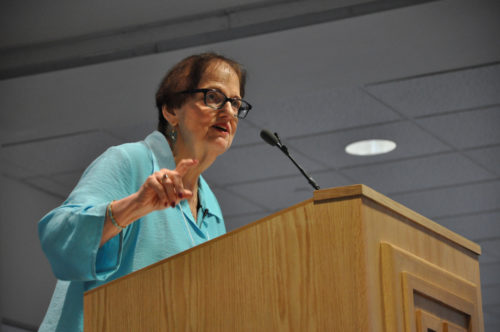
Speeding up the progress towards gender justice and eliminating other interlocking oppressions would be a good way to honor the first women ordained to the priesthood in the Episcopal Church, says Fredrica Harris Thompsett, Mary Wolfe Professor Emerita of Historical Theology at Episcopal Divinity School, during her July 26 keynote address. Photo: Mary Frances Schjonberg/Episcopal News Service
“This celebration must not be honored by excluding others,” Harris Thompsett said during her keynote address. “It should not be sentimentalized by Hallmark [greeting] card theology, or trivialized by invoking a too-small God, a non-controversial, semi-engaged complacent divinity.”
She gave three challenges to the approximately 230 women and men who attended the symposium. The first was to honor the first ordinations of women by becoming “much more insistent advocates for baptism as being chief among Holy Orders,” warning against what she called “creepy theology out there in everyday use” which assumes that deacons, priests and bishops are somehow more connected to God and called to be more prophetic than lay people.
The second challenge was to live truly into the “embodied nature of Anglican theology” that emphasizes the goodness of all creation and the dwelling of the incarnate Christ in us and us in him. All people, she said, must claim their bodies “as sacred vehicles of spiritual authority.”
Harris Thompsett’s third challenge was very specific, calling for making the House of Bishops 30 percent female in the next 10 years. That would mean electing about 50 or more “highly and diversely qualified women bishops,” she said. To do so would require more attention being paid to discrimination and tokenism in all search processes, including those for the episcopate, she added.
The symposium at Temple University also featured a panel of lay and ordained women who responded to Harris Thompsett’s speech. Participants included Bishop Carol Gallagher, the Rev. Miguelina Howell, the Rev. Pamela Nesbit, the Rev. Sandye Wilson and educator and social worker Nokomis Wood. The panel was moderated by the Very Rev. Katherine H. Ragsdale, EDS dean and president. Philadelphia 11 member Wittig closed the symposium with a meditation.
Wilson, the rector of St. Andrew and Holy Communion in South Orange, New Jersey, echoed comments made by her fellow panelists and Harris Thompsett about interlocking oppressions. For years black women were invisible in the Episcopal Church, she said.
“When they spoke of women, they spoke of white women, and when they spoke of black, they spoke of black men,” she said, adding that “we have to name these things because if we don’t name them, we’re subject to repeat them.”
Wilson, who was the fourth African-American woman ordained in the Episcopal Church, said “we need to be sure that we are radically welcoming everyone and that no one is left out or left behind, that the table is set for everyone and that no one on a committee has to advocate for one group or another.”
Ragsdale told the symposium that she heard a recurring theme about the “celebration of diversity along with the painful and … grief-giving and infuriating reality of how far we have yet to go in the church and the world to really celebrate that diversity” and the justice that ought to come with it.
She added that she also heard a call for people to value all four orders of ministry and to recognize that those in ordained orders must listen to the stories of the work done by lay people outside the doors of the church and empower those ministers to carry on.
A Diocese of Pennsylvania video of the panel discussion is here.
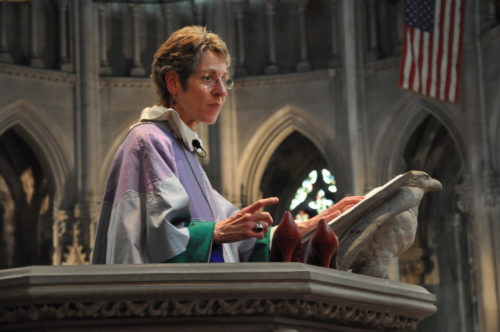
Presiding Bishop Katharine Jefferts Schori during her sermon at Church of the Advocate uses a pair of red high heels to illustrate the expectations set upon ordained women. Photo: Mary Frances Schjonberg/Episcopal News Service
Presiding Bishop Katharine Jefferts Schori, preaching and presiding at the celebratory Eucharist later in the day, said the entire Episcopal Church gives thanks that women now serve in all orders of ministry. As the congregation of about 600 roared its approval, she turned in the Advocate’s ornate pulpit and bowed to the five members of the Philadelphia 11 and one of the Washington Four who participated in the Eucharist.
Jefferts Schori reminded the congregation that women priests have been told that they should not wear high heels or dangly earrings in the pulpit or at the altar. After brandishing a pair of red high heels, she said “Women in all orders of ministry – baptized, deacons, priests, and bishops – can walk proudly today, in whatever kind of shoes they want to wear, because of what happened here 40 years ago.”
“We can walk proudly, even if not yet in full equality, knowing that the ranks of those who walk in solidarity are expanding,” she continued.
“Try to walk in the shoes of abused and trafficked women. Walk on to Zion carrying the children who are born and suffer in the midst of war,” the presiding bishop said. “Gather up the girls married before they are grown, gather up the schoolgirls still missing in Nigeria, and gather up all those lives wasted in war and prison. March boldly, proclaiming good news to all who have been pushed aside, and call them to the table of God, to Wisdom’s feast.”
Video and text of the presiding bishop’s sermon is here.
Attending the celebration from among the 11 members of the 1974 ordinations were the Rev. Alison Cheek, the Rev. Carter Heyward, the Rev. Merrill Bittner, the Rev. Marie Moorefield Fleischer and the Rev. Nancy Wittig.
Bishop Ramos processed with the women, as did the Rev. Betty Powell, one of the Washington Four, and retired Massachusetts Bishop Suffragan Barbara Harris, who this year is celebrating her 25th anniversary of being the first female bishop in the Anglican Communion.
Speaking during the announcement time, Ramos told the congregation that on July 29, 1974, “we decided to disobey the order of the church for the sake of the orders of the church.”
“We decided to end a discriminatory set of canons to make all the orders of the church both equally inclusive for men and women,” he said.
Pennsylvania Bishop Provisional Clifton “Dan” Daniel had been a priest for a year when he decided to participate in the Philadelphia ordinations (priests are often invited to join the ordaining bishop or bishops in the laying on of hands). He reminded the gathering that while the ordinations changed the history of the Episcopal Church, it was also a very personal event for the 11 ordinands.
“At the time I think we had a very different sense of what was at stake for us and of how much we had to gain or lose,” Heyward told ENS in an interview. “I just knew it was an important step to take given where the church was and given where I was in my life.”
In the same interview, Cheek said her already-raised consciousness “got raised a lot higher after her ordination. “It was a real big turning point in my life and I think that that was because quite a few oppressed groups of folk then reached out to us and wanted us to come celebrate for them,” she said.
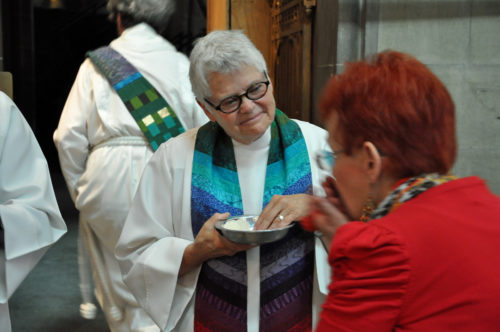
The Rev. Merrill Bittner, one of the Philadelphia 11 who was honored at the 40th anniversary celebration July 26, distributes communion at the Eucharist. Photo: Mary Frances Schjonberg/Episcopal News Service
In addition to experiencing the typical feelings of a person preparing for and then being ordained, before and after, the women were barraged with criticism that veered into outright threats. Called unprintable names, their appearances and their voices were examined and found wanting as were their personalities and intellects. Some were told they would be good for the church because it would be better to see them in the pulpit than ugly, old male rectors. They were accused of being immoral and self-indulgent. One received a length of fish cord with the suggestion that she use it to hang herself, according Darlene O’Dell in her new book “The Story of the Philadelphia Eleven.”
On the day of the ordinations, buckets were lined up along the church’s wall in case of bombs or fire, plain-clothed police officers were among the 2,000 congregants, a busload of police were stationed down the street and the congregation included a group of radical lesbians, some trained in crowd control and karate, O’Dell wrote.
The path to the Church of the Advocate and beyond
When, after years of struggle and rejection, the Philadelphia 11 broke the traditional prohibition against the ordination of women to the priesthood of the Episcopal and Anglican Churches they entered a sort of limbo. There was no canon in church law that specifically forbade women from being priests and there was no canon that said only men could become priests.
However, the canons did and do still outline a process leading to ordination first to the transitional diaconate and then to the priesthood. The final step of that process before priestly ordination is the approval by one’s standing committee. For women, that never happened.
While all 11 had been through the canonical process for ordination to the diaconate (which had been open to women only since 1970), just one of them had received the necessary Standing Committee approval for priestly ordination. Her bishop refused to ordain her. Another’s bishop said he would ordain her if the Standing Committee approved. It did not.
None of the eight bishops who had authority over the 11 agreed to the ordinations and the bishop of Pennsylvania objected to the ordinations taking place in that diocese. Bishops in the Episcopal Church are required to ordain only those people who have gone through the ordination process in their dioceses, or they must have the permission of the bishop who supervised that process. Thus, the Philadelphia 11’s ordaining bishops were seen to have violated church law as well as tradition.
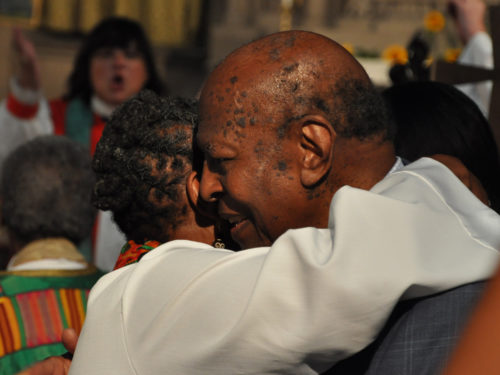
Charles V. Willie, who preached at the Philadelphia 11 ordinations, is greeted during the peace by the Rev. Renee McKenzie, vicar and chaplain of Church of the Advocate. Willie was vice president of the House of Deputies and a member of the Episcopal Church Executive Council at the time of the ordinations but he resigned both positions in protest when, three weeks later, the House of Bishops invalidated the ordinations. Willie read one of the readings during the July 26 Eucharist. Photo: Mary Frances Schjonberg/Episcopal News Service
On Aug. 15, 1974, the House of Bishops, called to an emergency meeting that reportedly was by turns rancorous and confused, denounced the ordinations and declared that “the necessary conditions for valid ordination to the priesthood in the Episcopal Church were not fulfilled.” In effect, the bishops said, nothing had happened at the Church of the Advocate and the 11 were still deacons – to whom they offered pastoral care.
Charges were filed against the ordaining bishops and attempts, ecclesial and otherwise, were made to prevent the women from exercising their priestly ministries.
Still, women’s ordination movement continued. Resigned Rochester Bishop George W. Barrett ordained four women deacons on Sept. 7, 1975, at the Church of St. Stephen and the Incarnation in Washington, D.C., despite Washington Bishop William F. Creighton’s refusal to allow the action. About 1,200, including 50 priests, attended. The Rev. Lee McGee, the Rev. Alison Palmer, the Rev. Betty Powell, all of Washington, D.C., and the Rev. Diane Tickell of Anchorage, Alaska, became known as the Washington Four.
In September 1976, the General Convention approved the ordination of women to the priesthood and episcopate by adding a new section to the church’s ordination canons that read: “The provisions of these canons for the admission of Candidates, and for the Ordination to the three Orders: Bishops, Priests and Deacons shall be equally applicable to men and women.”
The House of Bishops, during the 1976 convention, at first ruled that the Philadelphia 11 and the Washington Four would have to be re-ordained, calling the first actions “conditional ordinations” similar to the conditional baptism allowed in emergency situations when one is not sure if a person was baptized. The women said they would refuse to be re-ordained and, the next day, the bishops voted unanimously for a “completion” ceremony that would avoid the laying on of hands.
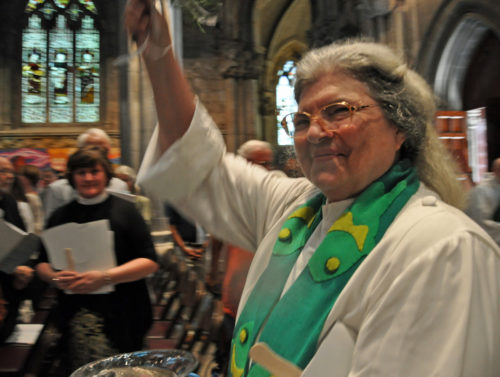
The Rev. Betty Powell, one of the Washington Four who were ordained in September 1975 and who was honored during the 40th anniversary celebration July 26, asperges the congregation during the Eucharist that emphasized the ministry of all the baptized. All six of the first women who attended the service sprinkled the congregation members with water from the baptismal font. Photo: Mary Frances Schjonberg/Episcopal News Service
The story was not yet over. In October 1977, the House of Bishops adopted “A Statement of Conscience” that assured that “No Bishop, Priest, or Lay Person should be coerced or penalized in any manner, nor suffer any canonical disabilities as a result of his or her conscientious objection to or support of the sixty-fifth General Convention’s actions with regard to the ordination of women to the priesthood or episcopate.”
The statement arose out of a meeting that began with Presiding Bishop John Allin saying he did not think “that women can be priests any more than they can become fathers or husbands,” and offering to resign as presiding bishop. The House of Bishops affirmed Allin’s leadership and adopted the “conscience clause” contained in a pastoral letter issued after the meeting.
Since the clause was never adopted by the House of Deputies, it had no canonical authority but a handful of bishops and their dioceses used it to bar women from the priesthood for 33 more years.
A more complete timeline of the history of women’s ordination in the Anglican Communion is here.
A statistical look at ordained women in the Episcopal Church today
- Church Pension Group’s 2014 annual report shows 2,471 ordained women participating in the clergy pension plan, compared with 4,188 males.
- Male clergy make up 62 percent of recently ordained employed clergy and 66 percent of all employed clergy, according to the organization’s latest State of the Clergy report from 2012.
- Recently ordained female clergy consistently make between $1,000 to $7,000 less than male clergy of the same age. Also, as female clergy’s age at ordination increases, compensation steadily decreases. Plus, females can expect a $1,766 smaller salary increase when changing parish positions.
- The report called this gap “striking” and said it points to “significant structural inequalities confronting female clergy when searching for new jobs.”
- “Our findings reveal that women clergy are consistently realizing smaller gains from taking new jobs than males, regardless of the type of parish they serve,” the report concluded.
Also for 2012, the Church Pension Group’s annual Clergy Compensation report showed that
- the median full-time compensation for all male priests, parochial and non-parochial, was slightly more than $10,000 higher than that for female priests ($75,747 for the 3,455 men compared with $65,438 for the 1,827 females).
- the median full-time compensation for senior male priests was $103,660 compared with $93,566 for senior female priests (there were 572 men in such positions and 138 women)
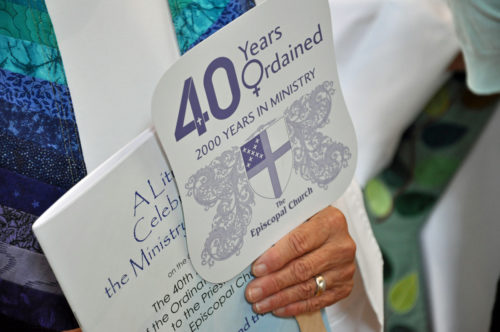
Celebration organizers offered commemorative fans to each of the more than 600 people who came to Church of the Advocate in Philadelphia July 26 to celebrate the July 29, 1974, priestly ordinations of 11 women deacons slightly more than two years before the General Convention of the Episcopal Church gave its explicit permission for women to become priests. Photo: Mary Frances Schjonberg/Episcopal News Service
Learn more about it
Where are the Philadelphia 11 – and their ordaining bishops – now?
“The Story of the Philadelphia Eleven,” Darlene O’Dell, (Seabury Books, 2014)
“Looking Forward, Looking Back: Forty Years of Women’s Ordination,” Fredrica Harris Thompsett, editor, (Moorehouse Publishing, 2014)
“The Spirit of the Lord is Upon Me: The Writings of Suzanne Hiatt,” Carter Heyward and Janine Lehane, editors, (Seabury Books, 2014)
“Forty Firsts,” an online series from Episcopal Commons and the Diocese of Los Angeles marking the 40th anniversary
A Diocese of Pennsylvania video about the Philadelphia 11, produced by Barbara Dundon, is here.
— The Rev. Mary Frances Schjonberg is an editor/reporter for the Episcopal News Service.

Social Menu